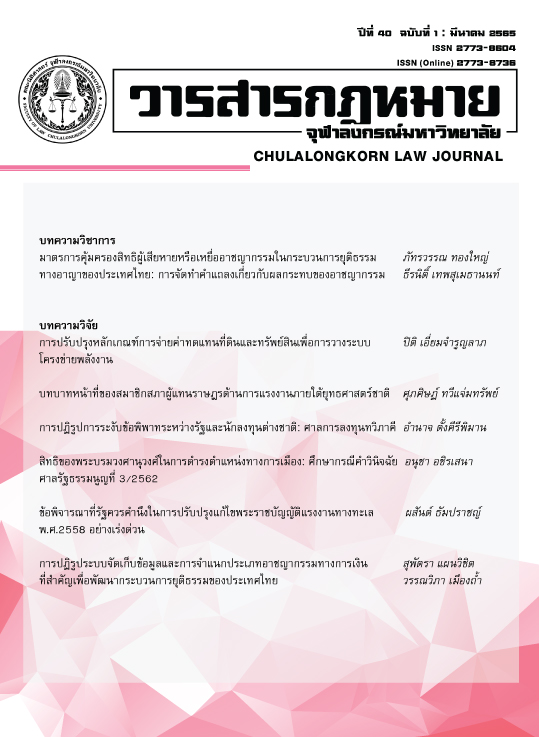การปฏิรูปการระงับข้อพิพาทระหว่างรัฐและนักลงทุนต่างชาติ: ศาลการลงทุนทวิภาคี
Main Article Content
บทคัดย่อ
ในการเจรจาความตกลงการค้าการลงทุนระหว่างไทยและสหภาพยุโรปที่กำลังดำเนินอยู่ในปัจจุบัน มีความเป็นไปได้สูงว่าสหภาพยุโรปจะเรียกร้องให้ไทยตกลงนำศาลการลงทุนระหว่างประเทศ ในลักษณะของศาลการลงทุนทวิภาคี (bilateral investment court) มาใช้เป็นกระบวนการระงับข้อพิพาทระหว่างนักลงทุนและรัฐ (ISDS) ตามสนธิสัญญาแทนกระบวนการอนุญาโตตุลาการอย่างที่พบเห็นได้ทั่วไปในสนธิสัญญาการลงทุนส่วนใหญ่ในปัจจุบัน ซึ่งสอดคล้องกับเนื้อหาที่ปรากฏในความตกลงที่สหภาพยุโรปเป็นคู่เจรจาหรือภาคีในช่วงที่ผ่านมา ได้แก่ Transatlantic Trade and Investment Partnership (TTIP) Comprehensive Economic and Trade Agreement (CETA) EU-Singapore Investment Protection Agreement (EU-Singapore IPA) และ EU-Vietnam Investment Protection Agreement (EU-Vietnam IPA) บทความนี้มุ่งศึกษาที่มา คุณสมบัติ ข้อดี และข้อเสียของการระงับข้อพิพาทระหว่างนักลงทุนและรัฐตามสนธิสัญญาโดยศาลการลงทุน เพื่อจะได้ทราบถึงข้อควรพิจารณาหรือข้อพึงระวังอันจะเป็นประโยชน์ในการกำหนดท่าทีการเจรจาและการเตรียมความพร้อมเข้าเป็นส่วนหนึ่งของระบบการระงับข้อพิพาทลักษณะนี้ของประเทศไทย จากการศึกษา พบว่าการนำระบบศาลการลงทุนทวิภาคีมาใช้ แม้จะปรากฏข้อดีอยู่บ้าง เช่น การจัดการปัญหาเรื่องภาพลักษณ์ความเป็นกลางของผู้ตัดสินคดี แต่อาจจะไม่ได้แก้ปัญหาข้อกังวลของ ISDS ที่ประเทศไทยคำนึงถึงมากนัก โดยเฉพาะอย่างยิ่งในส่วนของค่าใช้จ่ายที่ประเทศไทยต้องรับผิดชอบทั้งในฐานะภาคีของสนธิสัญญาการลงทุนและในฐานะคู่พิพาท และไม่มีความชัดเจนแน่นอนว่าการนำระบบดังกล่าวมาใช้จะทำให้แนวคำตัดสินมีความสม่ำเสมอสอดคล้องกันมากขึ้นกว่าระบบ ISDS โดยการอนุญาโตตุลาการที่เป็นอยู่เดิมหรือไม่
Article Details

อนุญาตภายใต้เงื่อนไข Creative Commons Attribution-NonCommercial-NoDerivatives 4.0 International License.
ลิขสิทธิ์และเนื้อหาในเว็บไซต์ของวารสารกฎหมาย (รวมถึง โดยไม่จำกัดเฉพาะ เนื้อหา รหัสคอมพิวเตอร์ งานศิลป์ ภาพถ่าย รูปภาพ ดนตรีกรรม โสตทัศนวัสดุ) เป็นกรรมสิทธิ์ของวารสารกฎหมาย และผู้ได้รับการโอนสิทธิทุกราย
1. วารสารกฎหมาย ให้อนุญาตให้คุณใช้สิทธิอันไม่เฉพาะเจาะจงที่สามารถถูกถอนเมื่อใดก็ได้ โดยไม่มีค่าใช้จ่าย ในการ
- เยี่ยมชมเว็บไซต์และเอกสารในเว็บไซต์นี้ จากคอมพิวเตอร์หรือเครื่องมือสื่อสารผ่านเว็บบราวเซอร์
- คัดลอกและจัดเก็บเว็บไซต์และเอกสารในเว็บไซต์นี้บนลงคอมพิวเตอร์ของคุณผ่านระบบความจำ cache
- สั่งพิมพ์เอกสารจากเว็บไซต์นี้สำหรับการใช้ส่วนตัวของคุณ
- ผลงานที่ได้รับการตีพิมพ์โดยวารสารกฎหมาย จุฬาลงกรณ์มหาวิทยาลัย ถูกคุ้มครองภายใต้ Creative Commons Attribution 4.0 International License ซึ่งอนุญาตให้ทุกคนสามารถคัดลอก แจกจ่าย ดัดแปลง ส่งต่อ ผลงานได้ ก็ต่อเมื่อผลงานและแหล่งข้อมูลได้รับการอ้างอิงอย่างเหมาะสม
2. วารสารกฎหมาย จุฬาลงกรณ์มหาวิทยาลัย สงวนสิทธิ์ไม่อนุญาตให้คุณใช้สิทธิอื่นใดที่เกี่ยวข้องกับเว็บไซต์และเอกสารบนเว็บไซต์นี้ เช่น การคัดลอก ดัดแปลง เปลี่ยนแปลง ส่งต่อ ตีพิมพ์ แจกจ่าย เผยแพร่ จัดแสดงในที่สาธารณะ ไม่ว่าจะในรูปแบบใดก็ตาม ซึ่งเว็บไซต์หรือเอกสารบนเว็บไซต์ โดยไม่อ้างอิงถึงแหล่งข้อมูลหรือโดยไม่ได้รับอนุญาตเป็นลายลักษณ์อักษรจากวารสารกฎหมาย จุฬาลงกรณ์มหาวิทยาลัย
3. คุณอาจขออนุญาตที่จะใช้เอกสารอันมีลิขสิทธิ์บนเว็บไซต์นี้โดยการเขียนอีเมลล์มายัง journal@law.chula.ac.th
4. วารสารกฎหมาย จุฬาลงกรณ์มหาวิทยาลัย เข้มงวดกับการคุ้มครองลิขสิทธิ์อย่างมาก หากวารสารกฎหมาย จุฬาลงกรณ์มหาวิทยาลัยพบว่าคุณได้ใช้เอกสารอันมีลิขสิทธิ์บนเว็บไซต์นี้โดยไม่ถูกต้องตามการอนุญาตให้ใช้สิทธิ ดังที่กล่าวไปข้างต้น วารสารกฎหมาย จุฬาลงกรณ์มหาวิทยาลัยอาจดำเนินคดีตามกฎหมายต่อคุณได้ เพื่อเรียกร้องค่าเสียหายที่เป็นตัวเงินและคำขอชั่วคราวให้คุณหยุดการใช้เอกสารดังกล่าว ทั้งนี้ คุณอาจถูกสั่งให้ชดใช้ค่าใช้จ่ายใดๆ ที่เกี่ยวข้องกับการดำเนินการตามกฎหมายนี้
หากคุณพบเห็นการใช้เอกสารอันมีลิขสิทธิ์ของวารสารกฎหมาย จุฬาลงกรณ์มหาวิทยาลัย ที่ขัดหรืออาจขัดต่อการอนุญาตให้ใช้สิทธิดังที่ได้กล่าวไปข้างต้น โดยเชื่อว่าได้ละเมิดลิขสิทธิ์ของคุณหรือของผู้อื่น สามารถร้องเรียนมาได้ที่ journal@law.chula.ac.th


